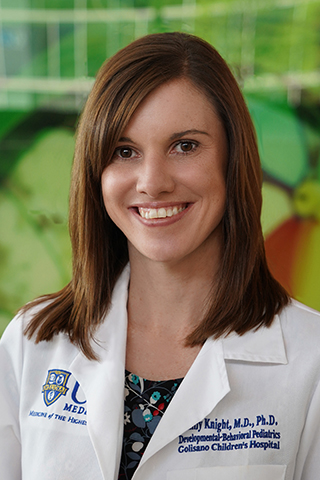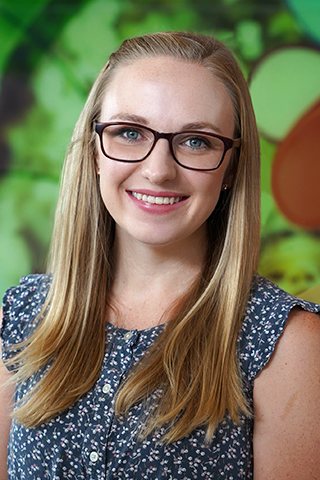News
Developmental and Behavioral Pediatrics' Dr. Emily Knight studies the impact of how people with autism process visual illusions
Tuesday, July 23, 2024
 Visual illusions continue to provide clues to how the brain processes what people with autism see. New research suggests that connections in the brain that send information about the context of what is being seen may operate more slowly in people with autism. “In that case, it would make sense for the brain to focus more on the details of what we are seeing than on the big picture,” said Emily Knight, MD, PhD, assistant professor of Neuroscience and Pediatrics and first author of the study published in the Journal of Neurophysiology. “Some of the things we would like to explore next are how these changes in timing might relate to the sensory or repetitive behaviors that we often see in individuals on the autism spectrum.”
Visual illusions continue to provide clues to how the brain processes what people with autism see. New research suggests that connections in the brain that send information about the context of what is being seen may operate more slowly in people with autism. “In that case, it would make sense for the brain to focus more on the details of what we are seeing than on the big picture,” said Emily Knight, MD, PhD, assistant professor of Neuroscience and Pediatrics and first author of the study published in the Journal of Neurophysiology. “Some of the things we would like to explore next are how these changes in timing might relate to the sensory or repetitive behaviors that we often see in individuals on the autism spectrum.”
Tom Golisano makes $50 million commitment to the University of Rochester to build the new Golisano Intellectual and Developmental Disabilities Institute
Thursday, June 13, 2024
The University of Rochester announced today that entrepreneur, philanthropist, and civic leader B. Thomas “Tom” Golisano has made a historic $50 million commitment, making it possible to build the Golisano Intellectual and Developmental Disabilities Institute at the University of Rochester Medical Center. The new world-class transdisciplinary center will provide solutions to the health and quality of life issues that affect people with intellectual and developmental disabilities (IDD). Those with IDD are a traditionally underserved population, with approximately 19,000 people affected locally, 120,000 regionally, and 200 million worldwide.
Read More: Tom Golisano makes $50 million commitment to the University of Rochester to build the new Golisano Intellectual and Developmental Disabilities InstituteBuilding Better Bridges: Outcomes of a Community-Partnered New School Transition Intervention for Students on the Autism Spectrum
Wednesday, June 12, 2024
Originally published June, 12 2024 in the Journal of Autism and Behavioral Disorders. Nuske, H.J., Smith, T., Levato, L. et al. Building Better Bridges: Outcomes of a Community-Partnered New School Transition Intervention for Students on the Autism Spectrum. J Autism Dev Disord (2024).
New school transitions can be challenging for students on the autism spectrum. No published, evidence-based interventions exist to support families and teachers of students transitioning to elementary and secondary school during this critical period. Using Community Partnered Participatory Research, we developed Building Better Bridges (BBB), a caregiver coaching intervention that includes training on effective school communication, educational rights, advocacy, and child preparation strategies.
Read More: Building Better Bridges: Outcomes of a Community-Partnered New School Transition Intervention for Students on the Autism SpectrumWhat Families of Children with Medical Complexity Say They Need: Humanism in Care Delivery Change
Tuesday, May 7, 2024
There is growing consensus that centering lived experience is needed to meaningfully transform the burdensome systems of care for children with medical complexity (CMC) and their families. The Collaborative Improvement and Innovation Network to Advance Care for Children with Medical Complexity quality improvement initiative, co-led with family colleagues, illuminates a critical real-world view of systems change to address unintended bias and demystify the medical model of care. We share candid themes in which families describe the need for systems to counteract widespread misconceptions and bias to achieve meaningful system change. We held family-designed, family-led focus groups (N = 127 across 27 groups) within 10 diverse state teams. Families were asked about CMC quality of life and family wellbeing.
Read More: What Families of Children with Medical Complexity Say They Need: Humanism in Care Delivery ChangeDr. Adriana Verwey Publishes Updated Inclusive Recreation Brochure
Sunday, March 10, 2024
 This week at the 24th annual Anne E. Dyson memorial grand rounds and community health symposium Dr. Adriana Verwey, Assistant Professor Department of Pediatrics, Developmental & Behavioral Pediatrics, was the special guest speaker in a discussion about promoting physical opportunities for all children. Dr. Verwey presented her updated inclusive recreation brochure "A Guide to Recreation and Leisure for All in Greater Rochester".
This week at the 24th annual Anne E. Dyson memorial grand rounds and community health symposium Dr. Adriana Verwey, Assistant Professor Department of Pediatrics, Developmental & Behavioral Pediatrics, was the special guest speaker in a discussion about promoting physical opportunities for all children. Dr. Verwey presented her updated inclusive recreation brochure "A Guide to Recreation and Leisure for All in Greater Rochester".
"Accessible recreation is a civil right and outlined in ADA accessible design standards" said Dr. Verwey
She empathized that providers who have knowledge of resources are a main facilitator of promoting inclusive recreation for children with disabilities. She discussed the health disparities that exist for individuals with disabilities and how the benefit of physical activity can improve these health disparities. Her research shows that the barriers to exercise for people with disabilities are not only program cost or transportation as would be expected, but nearly 50% of individuals reported they did not know how to exercise and, they did not know where to exercise or what facilities were available to them.
By creating this inclusive recreation brochure Dr. Verwey aims to share her knowledge of resources to accessible recreation throughout the Rochester community. She said,
“There are a lot of opportunities in our community for physical activity for individuals with disabilities”
The interactive map below was created by Dr. Verwey and displays various options for Inclusive Recreation, Dance/Theater/Music/Art, Parks and Playgrounds, and TIES (Together Including Every Student) programming within the various school districts in our region. Although we have a lot here, we don’t have enough here and we need more, she said. Dr. Verwey wants the community to know that there are places you can go! This brochure was supported with grants from the American Academy of Pediatrics, Special Olympics, and The Hoekelman Center.
Panelists at this event included members of local Rochester businesses and organizations such as - Healthi Kids, Rochester Accessible Adventures, Reconnect Rochester, Abilities Movement, and the Department of Recreation and Human Services.
The University of Rochester Intellectual and Developmental Disabilities Research Center is transforming the landscape of exploration
Tuesday, January 30, 2024

Batten disease is a devastating rare genetic disorder. While the genetic flaw that causes this disease is well known, scientists do not fully understand the connection between this mutation and the disease’s symptoms like behavioral changes, cognitive impairment, seizures, and vision loss. John Foxe, PhD, co-director of the University of Rochester Intellectual and Developmental Disabilities Research Center (UR-IDDRC), recently described a potential neuro marker for the disease that could represent a way to better understand this complex disease and, ultimately, help researchers measure outcomes in clinical trials.
“We [researchers] know it is a genetic single gene mutation that causes Batten disease and as a scientist that really gives us something to focus on,” said Foxe, who is also director of the Del Monte Institute for Neuroscience at the University of Rochester. “But clinically, what we do not fully understand is how the mutation changes connections in the brain. Our work has been aimed at developing a much better understanding of these changes and developing ways to measure these accurately. If we can figure out how to treat Batten disease, there's a very good chance we will gain insight into how to treat other rare diseases.”
Read More: The University of Rochester Intellectual and Developmental Disabilities Research Center is transforming the landscape of exploration